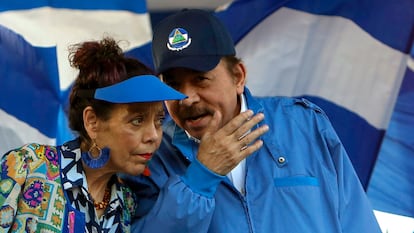Nicaragua’s financial woes deepen, putting Ortega regime under strain
The United Nations Green Climate Fund has blocked $116.6 million in funding, while the Central American Bank for Economic Integration has pushed back the delivery of a $3.5 billion loan


The Nicaraguan regime led by Daniel Ortega and his wife Rosario Murillo has suffered two recent setbacks in its search for international financing. Firstly, the United Nations Green Climate Fund (GCF) has blocked the disbursement of $116.6 million in funding for the Bio-CLIMA project to reduce deforestation and strengthen resilience in Nicaragua’s Bosawás and Río San Juan biospheres. And secondly, the Central American Bank for Economic Integration (CABEI) has pushed back by six months the payment of $3.5 billion in funding earmarked to expand and improve the country’s highways.
In the case of the Green Fund, which was approved in November 2020, the GCF Board of Directors decided a week and a half ago to freeze the funding “until all relevant policy non-compliance has been satisfactorily addressed.” The decision was made following a complaint filed by indigenous people from Bosawás and Río San Juan. The community members allege that they were not subject to “free, prior and informed consultation,” and that the Ortega-Murillo regime failed to comply with the requirement to identify an independent third party to supervise the project’s actions, and the transparent use of resources.
The indigenous people fear that financing for the BIO-CLIMA project could increase “environmental degradation” and the encroachment into their indigenous territories. This is already happening at the hands of so-called “colonists,” illegal settlers who, with high caliber weapons and under the protection of Sandinista officials, break into the communities. The indigenous people are forcibly displaced and the illegal settlers establish extractive industries such as mining, cattle ranching and agriculture in these protected forests. Nicaraguan organizations that work closely to tackle violence against indigenous communities estimate that in the last 10 years, 70 indigenous Miskito and Mayangna people have been killed by settlers. So far in 2023, there have been two massacres in Bosawás. Another hundred community members have been victims of kidnapping, rape, forced displacement, psychological trauma and injuries that have left them with amputations or in a quadriplegic state. Sandinista officials have been even involved in the illegal trafficking of ancestral lands in favor of the illegal settlers.
In response to the indigenous people’s complaint, the Independent Redress Mechanism (IRM) of the Green Climate Fund conducted an investigation and found that the project failed to comply with GFC policies.
The complaint also raised concern of the “likely non-compliance or inability of the Accredited Entity and Executing Entity to comply with GCF Policies and Procedures and the Conditions placed by the Board of the GCF during approval of this project.” The executing entities on the government’s side are the Ministry of Environment and Natural Resources, and the Ministry of Finance and Public Credit, while the accredited entity is the Central American Bank for Economic Integration (CABEI).
Delay of infrastructure funding
After the 2018 socio-political crisis in Nicaragua, when the Sandinista regime brutally cracked down on its critics, the CABEI became one of the main financiers of the regime, even though it has been accused of committing crimes against humanity. During his tenure, the chief of CABEI, Dante Mossi maintained close ties with the Ortega-Murillo family. His decision to grant Nicaragua loans was met with widespread criticism, so much so that he was not reelected to the post in last May’s vote. He was also accused of causing CABEI’s indicators to plummet.
Mossi, who is set to leave office in December, extended the deadline for the CABEI to begin disbursing the $3.5 billion loan to Nicaragua for six months. This means that it will be up to the new CABEI president to decide whether or not to authorize the funding, which is to go towards a project to improve and expand Nicaragua’s roads and highways. This poses a problem for the Nicaragua government, as the works to be financed by this loan had already been awarded by the Ortega-Murillo family.
During the events to celebrate of the 44th anniversary of the Nicaraguan Revolution, the government announced that work on the new Costanera highway was set to begin — with CABEI funding. It is not clear why Mossi has delayed the disbursement. However, the loan has a fifteen-year term and was approved by the Sandinista Parliament on June 28, 2022.
What is striking is that the contract for the loan states that disbursement must begin no later than 12 months after it has been approved by the Nicaraguan Parliament. If this is not done, the contract continues, CABEI can terminate the loan. When Mossi leaves the post, it will be up to his successor to decide whether to take this decision.
In the case of the Green Fund, Nicaragua has 120 days to comply with GFC policies and to unfreeze the $116.6 million in funding.
“The board of the Green Fund, which granted millions of dollars to the Ortega-Murillo dictatorship, finally made the right decision and decided to suspend the granting of said fund to Nicaragua due to non-compliance with policies and procedures,” Felix Maradiaga, a former presidential candidate who lives in exile in the United States, told EL PAÍS. “It is widely known that this fund, designed with good intentions in the framework of the Bio-CLIMA program, has been manipulated for years to finance the dictatorship’s political structures in several areas of the country.”
According to Maradiaga, the evidence is clear: “Human rights violations against indigenous communities and environmental depredation have increased dramatically under the Ortega and Murillo government. The granting of the green fund was a mockery of these communities. This suspension represents another victory in the civic struggle for democracy, human rights and transparency.”
Sign up for our weekly newsletter to get more English-language news coverage from EL PAÍS USA Edition
Tu suscripción se está usando en otro dispositivo
¿Quieres añadir otro usuario a tu suscripción?
Si continúas leyendo en este dispositivo, no se podrá leer en el otro.
FlechaTu suscripción se está usando en otro dispositivo y solo puedes acceder a EL PAÍS desde un dispositivo a la vez.
Si quieres compartir tu cuenta, cambia tu suscripción a la modalidad Premium, así podrás añadir otro usuario. Cada uno accederá con su propia cuenta de email, lo que os permitirá personalizar vuestra experiencia en EL PAÍS.
¿Tienes una suscripción de empresa? Accede aquí para contratar más cuentas.
En el caso de no saber quién está usando tu cuenta, te recomendamos cambiar tu contraseña aquí.
Si decides continuar compartiendo tu cuenta, este mensaje se mostrará en tu dispositivo y en el de la otra persona que está usando tu cuenta de forma indefinida, afectando a tu experiencia de lectura. Puedes consultar aquí los términos y condiciones de la suscripción digital.








































